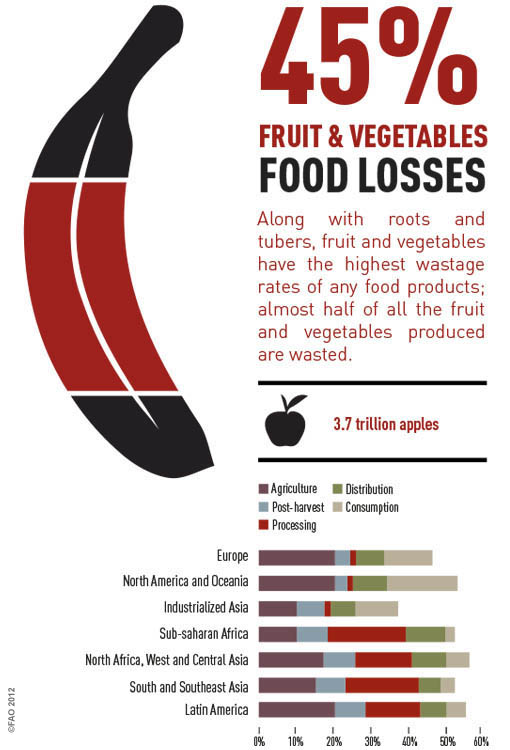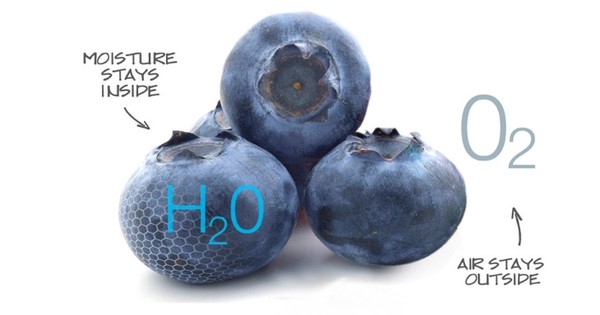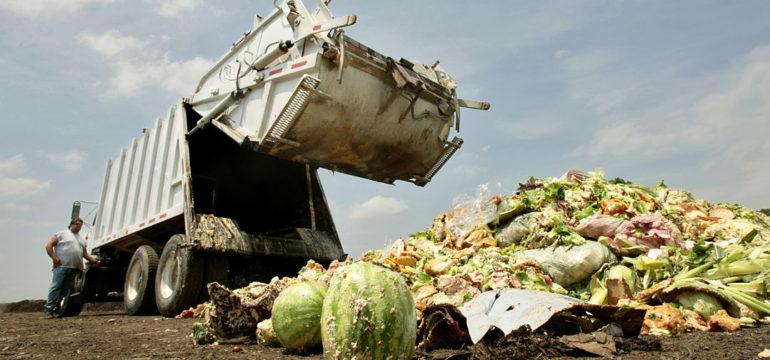
http://www.fao.org/save-food/resources/keyfindings/infographics/fruit/en/
“A freshly cut apple, a week-old banana, an open bottle of wine — what do these have in common? They are all common victims of the browning enzyme otherwise known as polyphenol oxidase or PPO. PPO is an enzyme that enables complicated oxidation reactions which usually lead to undesirable appearance, unfavorable taste, and unwanted degradation in nutrients. For years, scientists have strived to discover ways to deter this browning process, but an effective, natural, widely available inhibitor has yet to be discovered.”
This excerpt comes from the master’s thesis of a food scientist from UC Davis. That food scientist was me, Danielle Robertson, M.S. In my research, polyphenol procyanidin extracts were used, unsuccessfully, to prevent enzymatic browning in bananas. Seven years after that thesis was published, a company named Apeel Sciences has succeeded in creating an effective natural shelf-life extender entirely out of food waste. They succeeded where I did not, which is why I find this product so compelling.
This product, named Edipeel™, is an edible coating made from natural plant extracts. Essentially, Edipeel™ could mean the end of gas or wax treatments currently used to stall fruit ripening, reduced food waste, reduced pesticide use, and increased availability of different produce varieties that would otherwise not make the journey to the market. After successful field trials and commercial applications in 2016, select growers and producers are already using Edipeel™ on their crops.
How Does It Work?
The two leading causes of produce spoilage are oxidation and water loss. Apeel Science’s product Edipeel™ works as an ultra-thin barrier, applied to the surface of the fruit or vegetable, to keep moisture in and air out. Edipeel™ is made from plant-derived liquid extracts. When applied to the surface of produce, compounds in those extracts work to control the infiltration of water and gas, slowing the rate of decay. Edipeel™ can be applied post-harvest through spray, drip, and paint-on methods, which means pre-existing processing protocols would not have to undergo dramatic alterations in order to integrate Edipeel™application. Furthermore, Edipeel™ is presently being evaluated for Organic certification.

http://www.treehugger.com/green-food/produce-covered-invisible-plant-based-edible-coating-stay-fresh-twice-long.html
Reducing Food Waste from Both Sides
According to statistics from the Food and Agriculture Organization of the United Nations, Fruits and vegetables, plus roots and tubers have the highest wastage rates of any food. In developing countries 40% of losses occur at post-harvest and processing levels while in industrialized countries more than 40% of losses happen at retail and consumer levels. Food losses during harvest and in storage translate into lost income for small farmers and into higher prices for poor consumers. With Edipeel ™, those losses are minimized, so the benefits occur at several points through the food supply chain, from the farmer to the consumer.
Perhaps the best part about Edipeel™ is the fact it’s made with food that would otherwise be considered food waste. Edipeel™ is made from leaves, stems, banana peels and other plant materials left behind after fruits and vegetables have been processed. Though these plant materials serve no further purpose in the food chain, they can still add value to food products.
Consider the travels of a blueberry. Blueberries grown in Chile have to be picked before they’re ripe. The berries are then shipped under heavy refrigeration for the month-long journey to the United States. Despite all that, some of these blueberries are going to end up shriveled and moldy and thus unfit for purchase. Now imagine the Chilean farmer sprays a natural, practically undetectable coating on the berries before they’re shipped. The berries no longer require such heavy refrigeration because they’re not as susceptible to moisture loss. They arrive at the market still as plump and juicy looking as when they started their international voyage. Sure, there are still some that don’t make it into the hands of a consumer, but that pile of undesirable berries is much smaller. This is a world with less food waste. Thanks to food science, this is the world we live in.

http://www.businessinsider.com/apeel-sciences-food-edipeel-invisipeel-extend-life-2017-1
References:
Key Facts on Food Loss and Waste You Should Know!” Food and Agriculture Organization of the United Nations. N.p., n.d. Web. 09 Feb. 2017. <http://www.fao.org/save-food/resources/keyfindings/en/>.
Strom, Stephanie. “An (Edible) Solution to Extend Produce’s Shelf Life.” The New York Times. N.p., 13 Dec. 2016. Web. <https://www.nytimes.com/2016/12/13/business/an-edible-solution-to-extend-produces-shelf-life.html>.
Fresher Is Better.” Edipeel | Apeel Sciences. N.p., n.d. Web. 09 Feb. 2017. <http://apeelsciences.com/edipeel.html>.
Robertson, Danielle Lee. “Dissertations & Theses – Gradworks.” Procyanidin Oligomers and Polyphenol Oxidase: Methods for Extraction Optimization, Enzymatic Inhibition, and Application as a Natural Inhibitor. ProQuest Document View, 1 Mar. 2010. Web. 09 Feb. 2017. <http://gradworks.umi.com/14/77/1477104.html>.






Leave a Reply